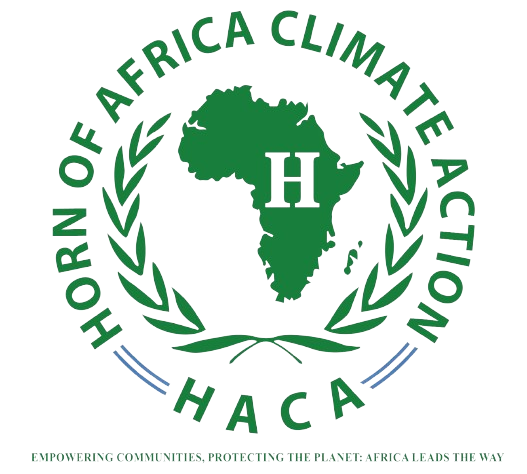The Horn Of Africa Climate Action (HACA)
Horn of Africa Climate Action (HACA): Horn of Africa Climate Action (HACA) is a non-profit organization based in Kismayo, Jubaland State of Somalia. The agency is registered in both Jubaland’s Ministry of planning & international cooperation and the federal’s National Ministry of Environment and climate change. HACA is dedicated to empowering young people, internally displaced persons (IDPs), and vulnerable communities to take climate action and create a sustainable future. The agency recognizes the urgent need to address climate change and the potential of the blue economy in the region. The organization offers climate education, awareness campaigns, training programs, capacity building, blue economy initiatives, and advocacy in Kismayo and its surrounding areas. HACA understand that the Horn of Africa and Somalia in particular is vulnerable to the impacts of climate change, including droughts, floods, and desertification. These environmental challenges have significant implications for the region's population, economy, and stability. Therefore, HACA seeks to mobilize regional cooperation and international support to mitigate and adapt to climate change in the Horn of Africa.
Here Are Some Key Aspects Of Tree Planting
Yiuym Ipsum Dolor Sit Amet, Consectetur Adipiscing Elit, Sed Do Eiusmod Tempor Incididunt Ut Labore Et Dolore Magna Aliqua. Quis Ipsum Suspendisse Ultrices Gravida. Risus Commodo Viverra Maecenas Accumsan Lacus Vel Facilisis.

Vision
Our Vision is a sustainable community where young people
actively engaged in protecting the environment. The organization strives to
create a sustainable and resilient environment where individuals have the
knowledge, skills, and opportunities to contribute to climate change mitigation
and adaptation while promoting the sustainable use of marine and coastal
resources.
Mision
HACA's mission is to empower young people, IDPs, and
vulnerable communities in Kismayo through climate education, awareness
campaigns, training programs, capacity building, blue economy initiatives, and
advocacy. By providing comprehensive support, HACA aims to enhance climate
literacy, promote sustainable practices, foster the sustainable development of
the blue economy, and actively engage individuals in climate action.
Key Objectives:
v
Empowerment
of Young People, IDPs, and Vulnerable Communities: HACA aims to empower
young people, IDPs, and vulnerable communities in Kismayo by providing them
with the knowledge, skills, and opportunities to actively participate in
climate action and sustainable blue economy initiatives.
v
Climate Education: HACA provides climate
education programs to equip individuals with specialized skills and knowledge
related to climate change mitigation, adaptation, and blue economy practices.
This education aims to enhance their employability and enable them to pursue
climate-resilient livelihoods.
v
Awareness
Campaigns: HACA conducts awareness campaigns to raise awareness among the
target audience about the importance of climate action, sustainable practices,
and the potential of the blue economy. These campaigns aim to educate and
engage individuals in addressing climate change challenges.
v
Training
and Capacity Building: HACA organizes training sessions and
capacity-building workshops to enhance the skills and knowledge of individuals
in Kismayo. These initiatives focus on climate change adaptation, disaster risk
reduction, sustainable livelihoods in the blue economy, and environmental
conservation.
v
Blue
Economy Initiatives: HACA recognizes the potential of the blue economy in
the region and promotes sustainable practices in fisheries, aquaculture,
coastal tourism, and marine resource utilization. This includes capacity
building for blue economy entrepreneurship, sustainable fishing practices, and
the development of community-led initiatives.
v
Advocacy
and Policy Engagement: HACA actively engages in advocacy efforts to promote
climate action, sustainable blue economy practices, and the rights of young
people, IDPs, and vulnerable communities. The organization collaborates with
stakeholders to influence policies at the local, regional, and national levels.
v
Participation
and Engagement: HACA believes in the power of inclusive decision-making
processes. It actively encourages the participation and engagement of the
youth, IDPs, and vulnerable communities in shaping climate policies, projects,
and initiatives. By including their voices, HACA ensures that climate actions
are locally relevant, responsive, and sustainable.
v
Access to
Resources and Opportunities: HACA recognizes the barriers faced by the
youth, IDPs, and vulnerable communities in accessing resources and
opportunities for climate action. The initiative works to bridge these gaps by
facilitating access to finance, technology, infrastructure, and markets.
Through partnerships with stakeholders, HACA aims to create an enabling
environment that supports the inclusion and participation of these groups in
climate action initiatives.
Implementation Strategies:
1.
Collaborative
Partnerships: HACA collaborates with local communities, government
agencies, international organizations, and other stakeholders to implement its
programs and initiatives. These partnerships ensure a holistic and integrated
approach to climate action and blue economy development.
2.
Participatory
Approach: HACA employs a participatory approach in designing and
implementing its activities. The organization actively involves the target
groups in the decision-making process, ensuring their needs, perspectives, and
aspirations are taken into account. This participatory approach enhances the
relevance and effectiveness of HACA's interventions.
3.
Tailored
Programs: HACA designs its programs and initiatives to meet the specific
needs and challenges of the target groups in Kismayo. The organization conducts
thorough assessments and consultations to understand the local context and
develop tailored interventions that address the unique socio-economic and
environmental conditions.
4.
Capacity
Building: HACA prioritizes capacity building by providing training,
workshops, and skill development programs. These initiatives enhance the
knowledge and skills of individuals, enabling them to actively participate in
climate action and pursue sustainable livelihoods in the blue economy.
